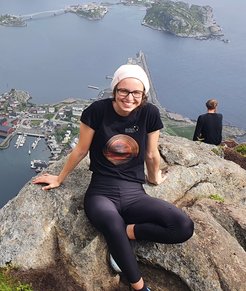Angela Borchers Pascual
PhD student in the “Binary Merger Observations and Numerical Relativity” group

What is your current position at our institute?
I'm a PhD student in the Binary Merger Observations and Numerical Relativity group.
How and when did you choose to do physics?
As a teenager, I used to go to a science event called “Naukas”, which was celebrated every year in my home country, and where scientists talked about their research in a very attractive and enjoyable way. Attending those talks influenced me a lot.
What is your academic education?
- BSc in Physics, University of the Basque Country
- MSc in Physics, Leibniz Universität Hannover
What were your previous academic positions?
- Summer Student in the Relativity and Gravitation group at the University of the Balearic Islands
- Teaching Assistant at the Albert Einstein Institute, Hannover
Can you please describe your research?
My research is focused on black-hole binaries, where two black holes merge to form a remnant black hole. I am particularly interested in asymmetric systems, where the remnant black hole can gain a recoil or kick velocity, travelling away from the binary and sometimes even their host galaxies. This process is imprinted in the radiated gravitational-wave signal, and my work is centred around the interpretation and modelling of these signatures, to better understand the sources of the signals observed in current and future gravitational-wave detectors.
Please let us know why you chose the Max Planck Institute for Gravitational Physics for your research.
I first joined the institute as a master's student and I enjoyed the experience a lot. The working environment is very supportive and encouraging, and there are many resources for us to grow as scientists. I feel very privileged that I could continue here for my PhD as well.
What would you recommend to a young woman wanting to start a career in physics?
From my experience, physics can be very exciting, and can open the door to many joyful experiences and wonderful people. But it's also true that sometimes the work can become overwhelming. So I think it's important to find a good balance between work and other aspects of life (I'm still figuring it out myself, too). And I also think it's important to find people who support you either in or outside work. This applies to anyone starting a career, independent of gender or any other aspect.
What is your vision for women and girls in science in 20 years?
As the number of women in science continues to grow, we now have more role models. That, together with the big campaigns aimed at encouraging girls to pursue STEM fields, will likely inspire more interest in future generations. So I definitely believe we will see a more diverse community in science. I also hope that by then, academia will offer more flexibility to women scientists who become mothers, as they naturally need to take time off from their careers.
